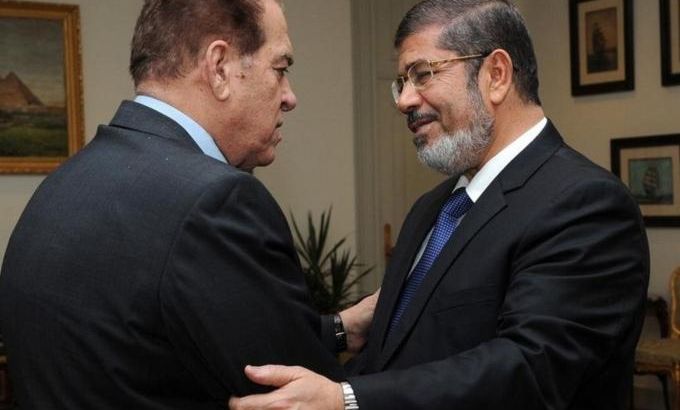Egypt’s Morsi begins forming new cabinet
Aide says president-elect to “declare cabinet soon” after holding talks with military and outgoing prime minister.

Mohamed Morsi, Egypt’s first democratically elected president, is preparing to select his new cabinet amid deep political divisions in the country.
Morsi held talks with the country’s military rulers on Monday as he attempts to coax a mistrustful army into relaxing its grip on power.
The vwinning Muslim Brotherhood candidate has started moving into the presidential palace and has already begun talks to appoint his new cabinet, days before the military is scheduled to transfer power, a campaign spokeswoman said.
“He has already started, with a list of names he is considering. He says he will declare the cabinet soon,” Nermine Mohammed Hassan, said.
State television showed images of Morsi sitting at a desk in the presidential palace, and others of the 60 year old sitting next to military ruler Field Marshal Hussein Tantawi during a visit to the military’s headquarters.
The military-appointed cabinet offered its resignation on Monday, state media reported, adding that it would assume caretaker responsibilities until Morsi forms a new cabinet.
In Cairo’s Tahrir Square, Muslim Brotherhood cadres pressed on with a days-long sit-in aimed at pressuring the military to repeal decrees granting it many of the disbanded parliament’s powers and a broad say in security policies.
The military also has control over the budget drawn up by the outgoing cabinet, which the Muslim Brotherhood-dominated parliament had strongly disputed.
Morsi retains the right to appoint the prime minister and cabinet.
Unity appeal
Morsi, who defeated his rival, former Mubarak premier Ahmed Shafiq, with 51.7 per cent of the vote, quickly moved to allay domestic and international concerns over the Islamists’ victory in the Arab world’s most populous country.
After being announced as the winner on Sunday, Morsi in a speech vowed to be president to all Egyptians and appealed for national unity.
Shortly before the polls closed last week, the generals issued a decree sharply limiting the powers of the new president. It permitted him to declare war, for example, only with the approval of the military council.
SCAF will also keep control of legislative power, and the budget, until a new parliament is elected. Egyptians went to the polls in November to elect a legislature, which was dominated by the Freedom and Justice Party, but it was dissolved earlier this month after a high court ruling found parts of the electoral law unconstitutional.
Despite Morsi’s victory, many of those questions about his power remain unanswered.
Economic challenges
Along with the daunting political tasks ahead of him, the president has to turnaround the economy which has been in terrible shape.
To spur growth and win over investors to trust Egypt for the long term, Morsi will have to restore stability to a country rocked by sometimes violent political turmoil in the 16 months since an uprising forced Hosni Mubarak from power.
Egypt’s uprising hammered the economy by chasing away tourists and foreign investors and prompting government employees to strike for higher wages.
The economy contracted by 4.3 per cent in the first quarter of 2011 and stagnated in the following three quarters.
The pile of local currency debt has built up to well over 600 billion Egyptian pounds ($99bn) from about 500 billion pounds just before the uprising.
The dangerously low level of reserves has left the country with less than three months of import coverage.